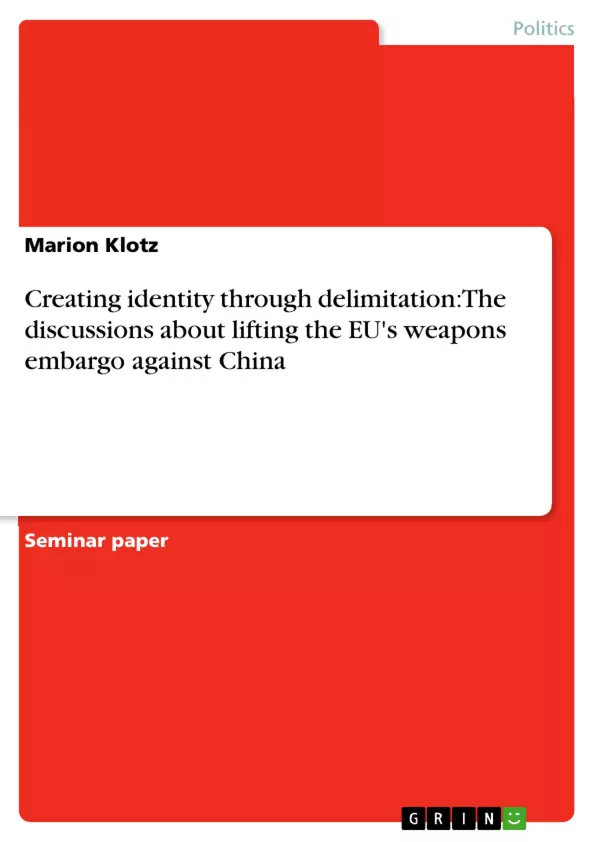The EU′s weapons embargo on China has been in place since the Tiananmen Square Massacre in 1989. After some aspects of the embargo had been lifted in the autumn of 1990, there was no real discussion about the relevance and the necessity of it for years. In 2003, however, some European states, notably France and Germany, suggested that the embargo should be lifted in order to normalize the relationship between the EU and China and to pave the way for further economic and political ties between the two powers. Predictably, the United States has since been lobbying vehemently against lifting the embargo. In early 2005, the decision was postponed after massive US pressure as well as the ratification of the Chinese Anti- Secession Law in which the PRC threatened to use military force against Taiwan. Furthermore, inner- European problems with the ratification of the new constitution lead to stalling of other projects, including the Code of Conduct and the Toolbox without which the embargo cannot be lifted. The question itself has not been forgotten, however, and most analysts expect the embargo to be lifted sooner rather than later. A rift in the transatlantic relationship between the EU and the US thus seems unavoidable.
The European Union as well as the PRC emphasize that lifting the embargo would be a symbolic move rather than the prelude to increased weapon transfers from Europe to China. The question remains, however, why the EU would "see benefit in the symbolic change of policy . . . when it would cause such anxiety in the heart of arguably their most significant true partner in the national security arena" (David Shambaugh, see Lawrence 2004: 28). One basic assumption of this paper is that the EU is not, as some critics put it, blind towards the strategic implications of a change in Chinese military power and power projection capabilities for the region and the international community. Rather, there must be different goals and aims of the European Union that outweigh the strategic doubts, most notably the European need for a newly constructed identity.
Inhaltsverzeichnis (Table of Contents)
- Introduction: A Constructivist Analysis of the Embargo
- Constructivism in International Relations
- The Social Construction of Reality
- Social Regions and Communities
- Collective Identities
- Identity Shaping From Within
- Identity Shaping From the Outside
- Identity Shaping Through Creation of the "Other"
- "We have Europe. Now we need Europeans": Constructing European Identity
- The European Need for an Identity
- China's Role in the Process of Identity Shaping
- Lifting the EU's Weapons Embargo on China: Differing Views Across the Atlantic
- A Short History of the Embargo
- The EU - Perspective: Why the Embargo Should Be Lifted
- The U.S. - Perspective: Why the Embargo Should Stay in Place
- A Stumbling Stone for the Alliance?
Zielsetzung und Themenschwerpunkte (Objectives and Key Themes)
The paper explores the EU's decision process regarding the lifting of the weapons embargo against China. It analyzes how the EU's need for a European identity might influence this decision, examining the discussion from a constructivist perspective.
- The social construction of identity and its relevance to international relations
- The development and challenges of European identity
- China's role in the process of European identity shaping
- The differing US and EU perspectives on lifting the weapons embargo
- The potential impact of the embargo discussion on transatlantic relations
Zusammenfassung der Kapitel (Chapter Summaries)
The introduction outlines the background of the EU's weapons embargo on China and its significance for transatlantic relations. It introduces the constructivist approach to analyzing the embargo discussion.
Chapter 2 introduces constructivism as a theoretical framework for understanding the social construction of reality and the role of identity in international relations. It delves into concepts like social regions and collective identities.
Chapter 3 focuses on the development and challenges surrounding European identity, highlighting the need for a unified identity and how China's role in this process might affect it.
Chapter 4 presents the main arguments for and against lifting the weapons embargo, examining the differing perspectives of the EU and the US, and discussing the potential impact of this issue on transatlantic relations.
Schlüsselwörter (Keywords)
The paper focuses on the key themes of constructivism, European identity, China, the EU's weapons embargo, transatlantic relations, and the social construction of identity in international relations. It also delves into the strategic implications of a changing Chinese military power and its influence on the region and the international community.
Frequently Asked Questions
Why did the EU impose a weapons embargo on China?
The embargo was imposed in response to the Tiananmen Square Massacre in 1989 as a political and moral sanction against the Chinese government's actions.
What are the main arguments for lifting the embargo?
Proponents, notably France and Germany, argue that lifting it would normalize relations, pave the way for better economic ties, and acknowledge China's development as a global power.
Why is the United States against lifting the EU's embargo?
The US is concerned about regional security, the strategic balance in the Taiwan Strait, and the potential transfer of sensitive technology that could enhance China's military capabilities.
How does "European Identity" play a role in this decision?
From a constructivist perspective, the EU may seek to lift the embargo to define its own independent foreign policy and identity, distinct from US influence, creating a sense of "European-ness" through autonomous action.
What is the "Chinese Anti-Secession Law"?
Ratified in 2005, this law allows China to use "non-peaceful means" against Taiwan, which significantly complicated the EU's discussions about lifting the weapons embargo.
Is the embargo purely symbolic?
While the EU and China emphasize its symbolic nature, the US and critics worry about the strategic implications and the message it sends regarding human rights and regional stability.
- Citation du texte
- Marion Klotz (Auteur), 2006, Creating identity through delimitation: The discussions about lifting the EU's weapons embargo against China, Munich, GRIN Verlag, https://www.grin.com/document/53278



